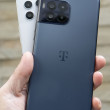LTE iPhone to be an AT&T Exclusive?
Tim Cook said:
"Two reasons — the first gen LTE chipsets force design changes we wouldn’t make. And Verizon customers told us they want the iPhone now."
http://www.cultofmac.com/tim-cook-on-why-verizon-iph ... »
Part of me said, "OK, so they realized the phone is going to have to add 3 mm in thickness to achieve LTE speeds and not suck the life out of the battery....
texaswireless said:
I don't think the "any app" applied to the manufacturers allowing any app on their OS. I think it applied to the carriers and their ability to restrict app usage such as skype mobile, Hulu, etc.
The trouble is, I can't find any documentation to support that position. I've found nothing definitive in the literature.
To find info on a topic that was not considered in the argument would be difficult indeed.
texaswireless said:
I don't think you will. The entire argument of the time was requiring the bidding carriers to make those allowances. Apple was bidding on nothing and therefore is not subject to the requirement.
To find info on a topic that was not considered in the argument would be difficult indeed.
Not finding info about a non-issue would be hard. What I'm surprised at is that I can't find any documentation on what the real requirements were.
http://en.wikipedia.org/wiki/United_States_2008_wire ... »
I can't find anything actually published by the FCC that spells out what the "open access" clause really entails.
I find that odd. I'm trying to prove myself wrong, but I can't find any data to indicate that what I'm saying is far-fetched.
Page 87, paragraph 217:
"Our rules regulate the functionality of the spectrum and the conduct of the licensee –"
And in the surrounding pages there is no mention of regulating the behavior of any organization other than the spectrum owner.
So, it looks like Apple could still walled-garden an LTE device as well.
Google’s idea was to create an open space for innovation where a person could buy any device (including one from Google) and run any app that met open standards with no interference by the carrier....
And depending upon how you interpret the rules, which Verizon fought in court before the auction, they also required that the wireless carrier only offer devices that are open and able to run any app. That interpretation would clearly rule out the iPhone, which is locked down by design, and only apps approved by Apple can be loaded onto the device without breaking the device’s warranty.
That’s how Markham Erickson, a technology law
(continues)
CellStudent said:
It looks like at least one telecom lawyer out there agrees with me:
http://www.wired.com/epicenter/2011/02/verizon-4g-ip ... »
Well, this one is going to the courts, for sure.
I certainly hope it goes to the courts. I don't understand how people can be so against carriers controlling apps that use the network, and at the same time, not giving a sh*t if a manufacturer controls what apps you have access to on your device.
When someone does challenge Apple on this, I think the final outcome will be similar to Microsoft's antitrust case.



